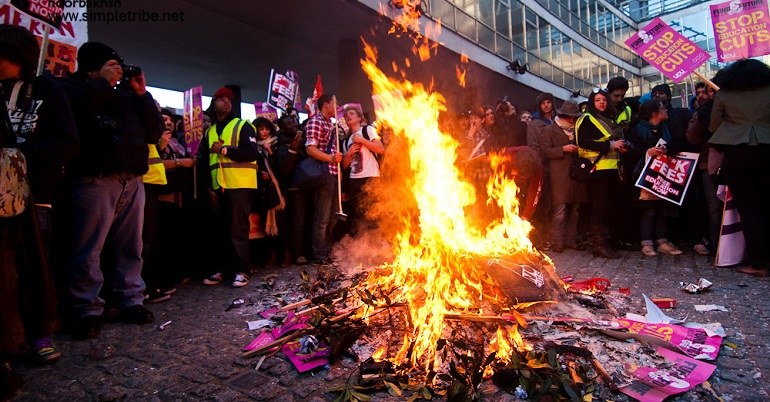10 years on from the student revolt, marketisation is still haunting our universities

How can we be in a situation where we are seeing students trapped behind fences on their own campuses? People have rightly reacted with horror, but this is a logical consequence of the marketisation of higher education.
Ten years ago to the day, in a moment that would politicise a generation and rock the foundations of the British state, students infamously organised the flashpoint of one of the most powerful movements the UK had seen in years, leading the fight against the tripling of tuition fees, the scrapping of the Education Maintenance Allowance and the wholesale marketisation of the education system. We knew what the imposition of hard market logic on our institutions of education would do to an entire generation, and how dramatic some of the consequences would be. A decade later, a new movement of students are protesting, withholding rent, and tearing down fences because the marketisation of our universities has become a threat to our lives.
How has this happened? When Tony Blair’s Labour government introduced and the Coalition government massively increased student fees, the focus was understandably on the injustice of young people being burdened with thousands of pounds of unpayable debt. But more than this, shifting the burden of funding higher education from the state to the individual was turning universities into corporations and students into consumers. The financial risk of our higher education system was shifted from government and onto university staff and students.
The Covid crisis has made that potential risk a fierce reality. Had young people deferred for a year or even stayed at home and not taken up university accommodation, the financial situation for many of our universities would have become untenable. Back in May, Universities in England called for a multi-billion pound long-term government bailout to protect against anticipated financial disaster in the sector. This was point-blank refused by the government. Instead, they were offered an early payment of £2.6bn in tuition fees – but this was not new money and it was nothing like enough to offset the costs of the pandemic.
University managements have appeared callous but the funding model has created an impossible conflict of interest for them. They should have prioritised the duty of care they have towards students and followed the advice from Independent Sage to switch to online learning. But because many are dependent on not just students’ fees but rent from accommodation, this would have tipped many of universities – many of them already with precarious finances – towards bankruptcy. To ensure the financial stability they need as corporations, universities and private accommodation providers have locked students into accommodation contracts they are unable to pay their way out of and turned campuses into hotbeds for Covid infection.
Covid has also thrown a spotlight onto the inequalities within our higher education system. Russell Group universities have had the resources to set up their own testing and tracing systems, ensuring greater safety and less anxiety for their students. The universities outside this charmed circle – whose students are much more likely to come from working class and BAME backgrounds – simply do not have the resources to fund such expensive systems.
This problem began with the introduction of student fees but it has been exacerbated by Gavin Williamson being absent without leave through the pandemic. Where were the plans for blended learning? Where was the provision of laptops for disadvantaged students? Where are the clear guidelines for university teaching to be moved online, called for by UCU to back up the new lockdown?
We need urgent action from Gavin Williamson to save our universities and protect the mental and physical well-being of our students. Full maintenance grants must be made immediately available to all current students and school leavers (regardless of any other support received from Student Finance), providing them with the means to cover their basic needs and have a decent standard of living. Students must be allowed to move out of their accommodation without financial loss, with the government picking up the tab. And for students in private accommodation, there must be an immediate extension of the eviction ban to ensure no one is priced out of their home.
Once the immediate crisis is passed, we need to reverse the disastrous, neoliberal funding model of tuition fees and the broken and bankrupt student loans system. At a time of vast public spending this should be an area of greater investment. As the only party in England and Wales that has always supported free university education the Green Party demands an end to tuition fees, the provision of decent living grants for all, and a write off of student debt.
The sight of students trapped behind fences should shock us all into action. But for universities to be truly free they must be publicly funded so that all young people have an equal chance to a higher education and so that universities do not depend on students as consumers to be financially viable. Ten years ago, students saw what was being done to them, and how the consequences of the Coalition’s actions were far greater than the burden of taking on a hefty loan. Covid-19 has proved us right, in the most horrific way imaginable. We continue to resist.
Rosie Rawle is co-chair of the Young Greens of England and Wales. The Young Greens are hosting an online talk – Covid, capitalism and crisis in Higher Education: Why the system needs an overhaul – with NUS President Larissa Kennedy on Wednesday November 11 at 8pm. You can register for the event here.
PS. We hope you enjoyed this article. Bright Green has got big plans for the future to publish many more articles like this. You can help make that happen. Please donate to Bright Green now.
Image credit: SemiSarah – Creative Commons




Leave a Reply